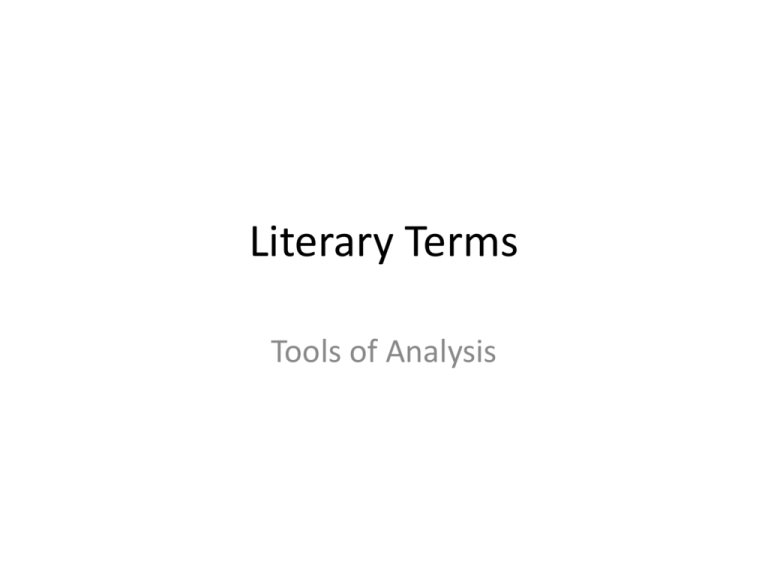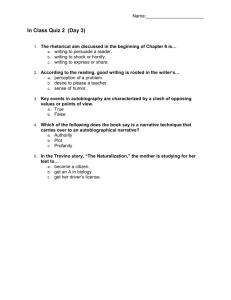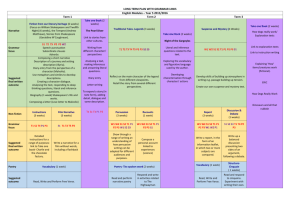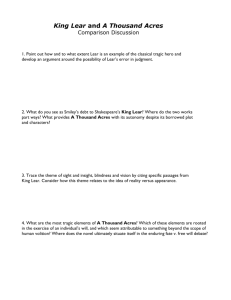Literary Terms
advertisement

Literary Terms Tools of Analysis Sources • For Definitions – Norton’s Anthology, textbook – Encarta Dictionary, online – The Happy Critic, Harvey Birenbaum • For Examples – Instructor, James Gonzales Style • The manner of a literary work is its style, the effect of which is its tone. All of the elements of literature working together in a particular work constitute its distinctive style. Connotation(s) • The different associations that a word can evoke. • The word white suggests purity and innocence. In “The Faerie Queene” Spenser tells us that Una rides a palfrey “more white then snow” and leads “a milke white lambe.” Yet Una is “much whiter . . . So pure an innocent . . . She was in life.” Denotation • Basic factual definition of a word • Words in older texts may be unfamiliar or have changed meaning. The Oxford English Dictionary presents the meaning of a word historically. • The word elf according to Encarta denotes “a small lively imaginary being resembling a human with pointed ears, often consider to have a mischievous nature and magical powers.” • This denotation fits Puck, Robin Goodfellow, from Shakespeare’s A Midsummer Night’s Dream. Alliteration • Repetition of an initial consonant sound • “Many a mournful man made mirth for his sake.” Sir Gawain and the Green Knight Onomatopoeia • Verbal sounds that imitate and evoke the sounds they denote • From Second Shepherds’ Play Sely Copple, our hen, Both to and fro She cackles But begin she to croak To groan or to cluck Rhyme • The repetition of identical vowel sounds in stressed syllables whose initial consonants differ. • From Second Shepherds’ Play For ponder These floods so they drown Both in fields and in town And bears all down And that is a wonder a b b b a rhyme scheme Allegory • Allegory is a form of symbolism operating through direct equivalences. The gentleman in Dickinson’s carriage stands for death, Goodman Brown’s wife for faith, Everyman for every man, and so forth. Birenbaum Euphemism • (Greek “sweet saying”) the figure by which something distasteful is described in less repugnant terms. • Referring to death as going to a better place is a good example of euphemism and also a modern example of kenning. Hyperbole • (Greek “throwing over”): overstatement, exaggeration • Shakespeare’s King Lear warns Kent “Come not between the Dragon and his wrath.” Lear, an eighty-year-old man, is exaggerating his power. Irony • (Greek “dissimulation): saying one thing and meaning the opposite • Situational irony results when things turn out the opposite of what might be expected • In King Lear, Gloucester is unable to see which of his sons is good until he is blinded. Metaphor • (Greek “carrying across”) the identification of one thing with another with which it is not literally identifiable • When King Lear asks Cordelia how much she loves him, she tells him, “I cannot heave my heart into my mouth.” She is telling him that she cannot put her love for him into words. Paradox • (Greek “contrary to received opinion) an apparent contradiction that requires thought to reveal an inner consistency • It is paradoxical that something bad, like losing his kingdom, can help King Lear to gain something good, a clear sense of his own position and an appreciation of the love of his daughter. Personification • The attribution of human qualities to nonhuman forces or objects • Speaking to the thunder and rain, King Lear tells them, “But yet I call you servile ministers, That will with two pernicious daughters join Your high-engendered battles against a head So old and white as this.” Pun • A sometimes irresolvable doubleness of meaning in a single word or expression. • When Claudius refers to Hamlet as son and seems concerned that “the clouds still hang” over Hamlet, mourning the death of his father too much. Hamlet responds, “Not so, my lord, I am too much in the sun.” Sarcasm • (Greek “flesh tearing”) a wounding remark, often expressed ironically • Albany and Goneril in King Lear Goneril: I have been worth the whistle. Albany: Oh, Goneril, You are not worth the dust which the rude wind blows in your face. Simile • (Latin “like”) comparison, usually using the word “like” or “as,” of one thing with another so as to produce surprising analogies. • Like flies to wanton boys are we to th’ gods. They kill us for their sport. Gloucester in King Lear Symbol • A symbol is an image that tends to generalize itself, so that it evokes associations with typical qualities of life. Birenbaum • Clothing is a symbol in King Lear. As Lear grows in self-awareness, rich clothing becomes less important: “unaccommodated man is no more but such a poor, bare, forked animal as thou art. Off, off you lendings! Come; unbutton here.” Rhythm • (Greek “to flow”) the patterns of sound within the feet of verse lines. • Chaucer’s description of the Clerk creates a distinctive rhythm. But al that he mighte of his freendes hente On bookes and on lerning he it spente And bisily gan for the soules praye Of hem that yaf him wherewith to scoleye Accent • (stress) the special force devoted to the voicing of one syllable in a word over others. • Poets are aware of the accents of words as they work out the meter and rhythm of a line. Notice that accenting the first syllable yields a noun but on the last syllable a verb. In Lear’s CONflict with his daughters, his desires conFLICT with theirs. They do not perMIT him to party without a special PERmit. Caesura • (Latin “cut”) a pause or breathing space within a line of verse, generally occurring between syntactic units • Anglo-Saxon poetry often indicates the caesura with spaces, as in Caedmon’s Hymn: Nu sculon herigean Meotodes meathte herofonrices Weard and his modgeþanc caesura Iamb • The basic foot of English verse; two syllables, with pattern of a unstressed syllable followed by a stressed syllable. Since brass, nor stone, nor earth, nor boundless sea Shall I compare thee to a summer’s day Pentameter • (Greek “five measure”) in English verse, a fivestress line. Basic line for Chaucer, Shakespeare, Milton • From Sonnet 65, Shakespeare Since brass, nor stone, nor earth, nor boundless sea Tetrameter • (Greek “four measure”) a line with four stresses • Andrew Marvell uses iambic tetrameter couplets in “To His Coy Mistress” Had we but world enough and time This coyness, lady, were no crime We would sit down and think which way To walk and pass our long love’s day Blank Verse • Unrhymed iambic pentameter lines, as in most of Shakespeare’s plays and Milton’s epics. Of man’s first disobedience and the fruit Of that forbidden tree, whose mortal taste Brought death into the world and all our woe With loss of Eden, till one greater Man . . . no rhymes Couplet • Two consecutive, rhyming lines usually containing the same number of stresses. Chaucer introduced the iambic pentameter couplet in Canterbury Tales. When that April with his showres soote The droghte of March hath perced to the roote couplet And bathed every veine in swich licour Of which ertu engendred is the flowr couplet Quatrain • A stanza of four lines, usually rhyming abcb, abab, or abba. That time of year thou mayst in me behold When yellow leaves, or none, of few, do hang Upon those boughs which shake against the cold, Bare ruined choirs, where late the sweet birds sang. a b a b Refrain • Usually a single line repeated as the last line of consecutive stanzas with subtly different working and ideally with subtly different meaning as the poem progresses. • In “Epithalamion” Spenser uses variations of this refrain 23 times: That all the woods may answer and your Eccho ring. Sonnet • Fourteen-line poem, usually in rhyming iambic pentameter. Petrarchan sonnet (octave and sestet) and Shakespearean sonnet (three quatrains and couplet) • Some of Shakespeare’s most famous poems Shall I compare thee to a summer’s day When to the sessions of sweet silent thought That time of year thou mayst in me behold First-person Narration • A narrative in which the voice narrating refers to itself with forms of the first-person pronoun (I, me, my, we, us, our) and in which the narrative is determined by the limitations of that voice. Chaucer’s frame narrative for The Canterbury Tales is told in first person. Gulliver’s Travels is told in first person by fictional character Lemuel Gulliver. Third-person Narrative • A narrative in which the narrator recounts a narrative of characters referred to by third person pronouns (he, she, they) without the limits of a first-person narrative. Sir Gawain and the Green Knight is a third-person narrative. The narrator is not part of the events and rarely mentions himself, except to say that it would “tax my wits” to describe something better. Omniscient Narrator • (Latin “all-knowing narrator”) A narrator who, in the fiction of the narrative, has complete access to both the deeds and the thoughts of all the characters in the narrative. The narrator of Paradise Lost, written by John Milton, knows and tells all, even what is spoken and done in Heaven and Hell, besides what is happening in the Garden of Eden. Frame Narrative • A situation which provides a context in which a collection of stories can be presented. (JG) Chaucer goes on a pilgrimage and meets his twentynine fellow pilgrims as well as the host of the Tabard, Harry Bailey. Their agreement to tell stories to make the travelling more agreeable creates the frame narrative structure of The Canterbury Tales. Comedy • Comedy deals with humorously confusing, sometimes ridiculous situations in which the ending is, nevertheless, happy. Shakespeare’s All’s Well that Ends Well and As You Like It are comedies. Their titles suggest that the audience will enjoy a story with a happy ending, often a wedding. Dialogue • (Greek “conversation”) Conversation presented verbatim in novels and plays. Lear: But goes thy heart with this? Cordelia: Ay, my good Lord. Lear: So young and so untender? Cordelia: So young, my Lord, and true. Lear: Let it be so. Then truth shall be thy dower. Dramatic Monologue • (Greek “single speaking”) a poem in which the voice of a historical or fictional character speaks, unmediated by any narrator to an implied though silent audience. • “Ulysses” by Tennyson is a prime example of a dramatic monologue. Elegy • Poetry of loss, especially upon the death of a loved person. • Excerpt from Milton’s elegy for Shakespeare What needs my Shakespear for his honour’d Bones, The labour of an age in piled Stones . . . Dear son of memory, great heir of Fame, What need’st thou such weak witnes of thy name? Epic • Extended narrative poem celebrating a hero who embodies the virtues most valued in his culture. (JG) Epithalamion • (Greek “concerning the bridal chamber”) a wedding poem, celebrating the marriage and wishing the couple good fortune. • Spenser’s “Epithalamion” p. 907 Fabliau • (French “little story”) a short, funny, often bawdy narrative in low style. • Chaucer’s “The Miller’s Prologue and Tale” p. 239 Lyric • (Greek “lyre”) Initially meaning a song, “lyric” refers to a short poetic form, without restriction in meter, but with expression of personal emotion, often in first person. Myth • One version of reality (Birenbaum) • The narrative of a protagonist with or subject to superhuman powers. A myth expresses some profound truth. • Besides Greek myths, other myths such as the Arthurian myths of the Round Table give us stories which presents in an imaginative way the stages of life that people, in general, experience. Novel • Usually long prose works, giving high priority to narration of events, novels are rooted in a specific, often complex, social world, and are often focused on one character or small circle of central characters. • Gulliver’s Travels can be considered as an early example of a novel. Ode • (Greek “song”) A lyric poem in elevated style often addressed to a natural force, a person, or an abstract quality • Keats “Ode to a Nightingale” Pastoral • (Latin “pastor, shepherd”) Pastoral is set among shepherds and represents an idyllic, idealized version of their world Satire • A genre in which the author, driven by exasperation, targets social ills, hoping to correct them by exposing them. (JG) • Practically all of Swift’s works. Tragedy • A dramatic representation of a character, who driven by hubris, precipitates a catastrophe, which destroys his flawed sense of reality and prompts a more accurate evaluation. (JG) Allusion • A passing but illuminating reference with a literary text to another, well-known text, often biblical or classical. Apostrophe • (Greek “turning away”) an address, often to an absent person, a force, or a quality. Canon • (Greek “rule”) the group of texts regarded as worthy of special respect or attention by a given institution. Also, the group of texts regarded as definitely having been written by a certain author. Catharsis • (Greek “cleansing”) According to Aristotle, the effect of tragedy on its audience, through their experience of pity and fear, was a kind of spiritual cleansing. Character • The [virtual] person, personified animal, or other figure represented in a literary work. Round or flat characters. Stock characters. Convention • A repeatedly recurring feature of works, occurring in combination with other recurring formal features. • In Shakespeare’s plays, the convention of disguises is absolute. In King Lear, once Edgar disguises himself as Mad Tom, not even his father would ever recognize him. Decorum • (Latin “that which is fitting”) a rhetorical principle whereby each formal aspect of a work should be in keeping with its subject matter and or audience. Dramatic Irony • A feature of narrative and drama, whereby the audience knows that the outcome of an action will be the opposite of that intended by a character. Parody • A work that uses the conventions of a particular genre with the aim of comically mocking a particular feature of a genre. Persona • (Latin “sound through”) originally the mask worn in the Roman theater to magnify an actor’s voice. In literary discourse persona refers to the narrator or speaker of a text, by whose voice the author may mask him- or herself. Protagonist • (Greek “first actor”) The hero or heroine of a drama or narrative Rhetoric • The art of verbal persuasion Scene • A sub division of an act. The action of a scene usually occurs in one place. Soliloquy • (Latin “single speaking”) A convention of drama, in which a character, alone or thinking to be alone on stage, speaks so as to give the audience access to his or her private thoughts. Vernacular • (Latin “verna” servant) the language of the common people as distinguished from learned and arcane languages. Wit • In Renaissance, “wit” became a literary ideal of the brilliant play of the full range of mental resources. • Alexander Pope True wit is Nature to advantage dressed What oft was thought but ne’er so well expressed. Kenning • A metaphoric expression, often a phrase, used to denote another word in Old English poetry. (Encarta Dictionary) Epic Simile • A lengthy simile developed over a number of lines of verse in narrative poetry (Encarta Dictionary)





